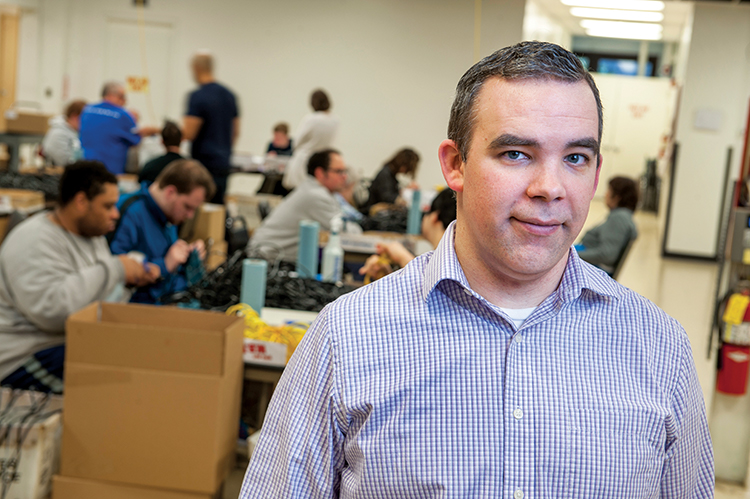Photo by Nick Romanenko
In the United States, only 33% of people who were able to work, but had a disability, were employed, according to a January report by the Kessler Foundation/University of New Hampshire Institute on Disability. “Of any minority group, people with disabilities are those with the highest level of unemployment,” says Matthew Putts ’07, CEO of Employment Horizons. He and his staff at the New Jersey company seek to change that statistic every day.
Employment Horizons works with more than 400 people a year to provide opportunities like job training, job placement, and support services. But, sometimes, people with disabilities are still passed over for work. “Frankly, many employers don’t give people with disabilities a chance,” Putts says. This is typically due to myths about the expense of accommodations or perceived liability. Often, he says, the diversity and value people with disabilities bring to the workplace is overlooked.
Putts and his team are determined to help. Employment Horizons handles some commercial contracts, through which those with disabilities are hired as janitors and groundskeepers. Those with more significant disabilities, usually developmental delays, can enter Employment Horizons’ flagship fulfillment program — they’re hired to work within the company, completing tasks like testing products for cable providers and assembling mailings. These opportunities build work history and teach soft skills, leading to a greater chance of employment at other companies. The company also provides job placement services for individuals ready to for competitive employment in the community.
Most of the business’ revenue is self-generated, coming from its commercial contracts, fundraising, and some government funding — Putts works on the state level to protect that last source. “Budgets, particularly state budgets, are subject to the recommendations and oversight of various committees on an annual basis, so we’re always advocating to make sure we don’t lose any funding, and also get increases when there are changes such as increases to the minimum wage,” Putts says.
He also uses his role to educate politicians on the circumstances of people with disabilities, frequently making the trek from New Jersey to Washington, D.C., to meet with legislators. That work is paying off — in September, New Jersey Rep. Mikie Sherrill visited Employment Horizons to learn more about its efforts. Putts hopes politicians like Sherrill will remember the company’s work when legislation for people with disabilities is on the table.
Putts considers himself the crisis management type, and for good reason — he volunteered as an EMT until 2019, through high school and Colgate. While volunteering with Southern Madison County Volunteer Ambulance Corps, he got a taste for leading others as a student coordinator. As a psychology major, he discovered the basis for his motivation. “In those classes, I realized what I liked about being an EMT was jumping into a situation and quickly finding a way to make stuff better,” he says. He also credits the psychology department with giving him the foundation for a master’s and PhD in rehabilitation counseling.
Though he works in a rewarding field, the nature of Putts’ job presents many challenges. When he needs an extra dose of inspiration, he walks out of his office, down the stairs, and into the fulfillment center to see the strides being made by people with disabilities.

